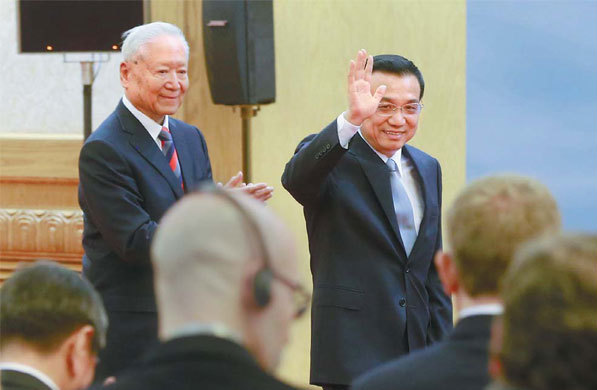Li makes plea on reform
Changes to local government bring better than expected results: premier
Premier Li Keqiang urged local authorities on Friday to follow the central government's lead in reforming government functions - to allow the market to have a bigger say, and provide a better service for the public.
Government reform that began at the start of this year has already achieved better than expected results, Li said at a national video conference with local government officials.
He said that with 334 central-level approval rights either revoked or transferred to local governments, the number of newly registered enterprises has increased by 25 percent so far from the same period last year.
|
Premier Li Keqiang and Zheng Bijian, president of the China Institute of Innovation and Development Strategy, attend the opening ceremony for a meeting of the 21st Century Council in Beijing on Friday. The council focuses on global governance reform. Feng Yongbin / China Daily |
Of all newly registered companies, the number of privately owned ones has increased by 37 percent, fueling a 23 percent rise in the nation's total private investment.
The State Council - China's Cabinet - has made government reform a priority despite the slowdown in domestic growth and the complicated international environment, Li said.
He stressed that further reforms of the local government administrative system will improve relationships between government and the market, government and society, as well as between central and local authorities.
It can also trigger the market's creative power and promote economic transformation and upgrading, the premier said.
In a week's time, the Communist Party of China will hold the Third Plenary Session of its 18th Central Committee, which is expected to unveil a blueprint for reforms on an even broader scale over the medium to long term.
Analysts said the consistent transformation of government functions from top to bottom is an area where a breakthrough can be made in deepening reform.
Only consistent actions and effective implementation of the policies can result in landmark reform, said Zhang Zhiwei, chief China economist at Nomura Securities.
The cancelation or delegation of powers, and improved administrative governance for local authorities will further reduce entry barriers for private investment, which is expected to create more job opportunities and improve the business-creation environment, Zhang said.
Li said enthusiasm for social investment and entrepreneurship is surging amid stable and increasing economic growth and the results of structural reforms have exceeded people's expectations.
In April, the State Council released a guideline to reduce intervention in investment and production activities.
Seventy-one items previously subject to central government approval no longer require such approval.
The guideline has been viewed as the first step by the new leadership to deepen economic reforms.
By the end of October, the 334 items that previously required administrative approval from the central government had either been canceled or delegated to lower levels.
Zhang Zhihong, a professor at the Zhou Enlai School of Government at Nankai University, said that requiring local governments to transform their function will be difficult and will take time.
Some administrative approval power relates to the income of local governments, and some officials may forge these results or even turn to corruption to protect their own interests, Zhang said.
He suggested tightening the legal system and improving a broad supportive institutional system to constrain and coordinate responsibilities between the central and local governments.
Zhang Chenghui, director of the Institute of Finance at the Development Research Center of the State Council, a think tank, said the further reduction of local governments' intervention in investment will open more areas for private capital.
Under the transformation, local government financing activities will be further regulated, which is favorable to deepening fiscal and taxation-system reform, Zhang said.
"But local governments may face more pressure on income in the near term, which requires the central government to better balance growth stabilization and structural adjustment," he added.
Since the third quarter, the world's second-largest economy has seen a steady rebound, providing more room to accelerate reforms.
GDP growth accelerated to 7.8 percent from July to September, compared with 7.5 percent in the second quarter and 7.7 percent in the first.
chenjia1@chinadaily.com.cn

























